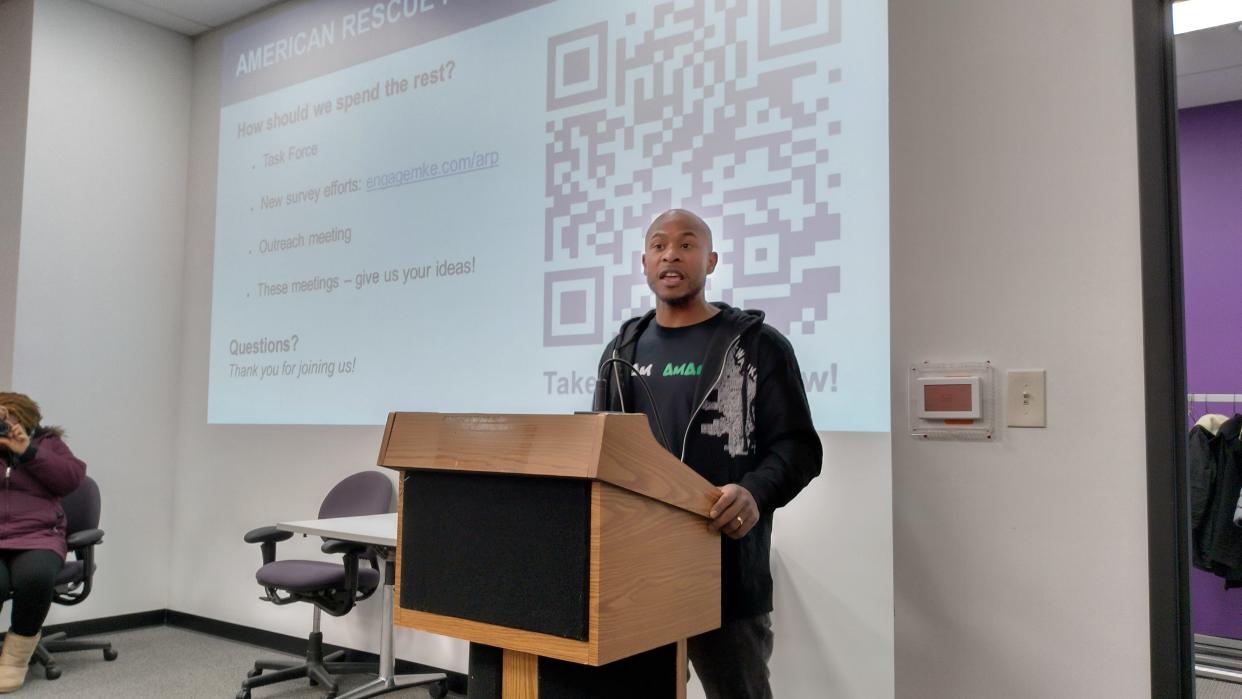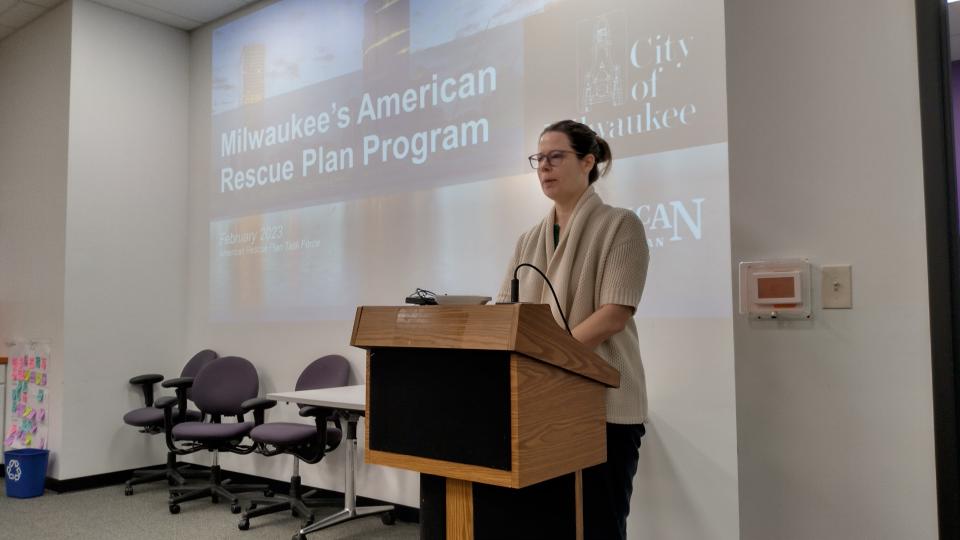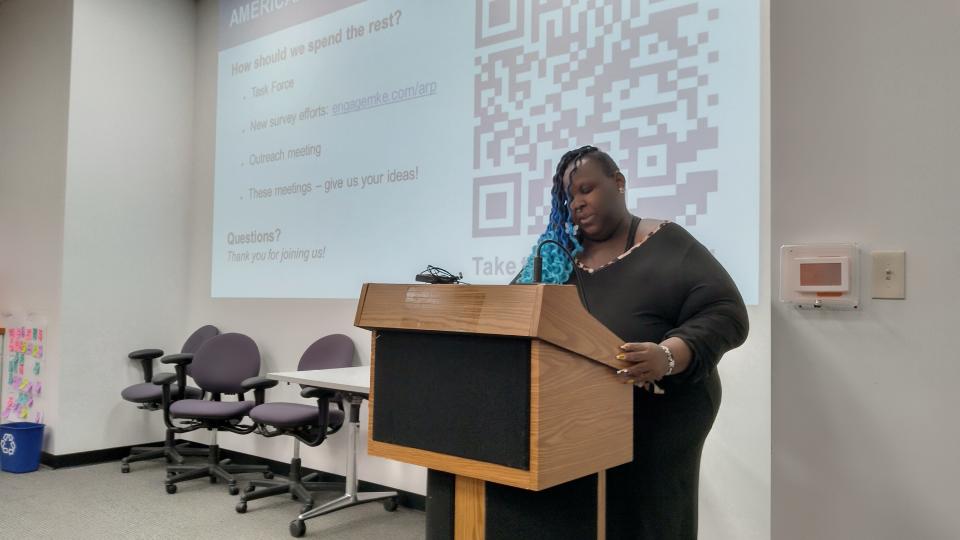Use it or lose it: City task force wants input on how to spend the last of its ARPA dollars

The city of Milwaukee is down to its last $92.7 million in pandemic relief funding and is seeking residents' input on how to spend it.
Bridget Siler, of Riverwest, had a few ideas.
“I would like the city to prioritize transportation and safer road infrastructure for pedestrians and bikes. I think it is really important for a healthy city to have alternative forms of transportation,” said Siler, a recent transplant from North Carlina.
Rick Banks, a Harambee neighborhood organizer, wants the funds to improve housing, including lead abatement, home repair grants, or down payment assistance.
“Anything that we could do to help increase housing stability is what I would love to see,” Banks said.
Siler and Banks were among the residents that packed a community listening session over the weekend to give input on how to use the city's remaining money from the American Rescue Plan Act. Saturday's meeting — the first of three sessions that the city’s ARPA Funding Allocation Task Force to solicit that feedback — was held at Riverworks, 526 E. Concordia Ave.
Milwaukee received $394.2 million in ARPA money to be used in a variety of ways including mitigating negative economic effects caused by the pandemic. So far, the city has allocated $301.7 million of that money. The money must be allocated by 2026 or returned to the federal government, said Ald. Milele Coggs, the task force's chair.
“It’s important that we hear from the residents as far as what their priorities are,” Coggs said.

The city last year set up the task force to provide elected leaders with spending recommendations for the remaining funds. Finance and Personnel Committee will take up the recommendations on March 15 followed by a council vote on March 21.
City leaders allocated the first half of the ARPA funding to a series of initiatives, including affordable housing, lead paint abatement and related workforce development, and efforts to curb reckless driving. Last year, the Common Council and Mayor Cavalier Johnson set aside $96.9 million of the $197.1 million second half with a focus on maintaining city services amid serious financial pressures.
Coggs said the city's financial picture remains the same. That means a majority of the $92.7 million will go to maintain city services like trash pickup and street repair. Even that, she said, will not be enough to meet the city's obligations. But there is an opportunity for a portion of the money to be used to address residents' priorities, she said.
One priority that dominated much of the meeting was lead contamination. Deanna Branch, a Northside resident, has two children impacted by high lead levels. Her youngest son, Aidan, has been hospitalized twice because of the severity of lead in his blood. She wants the city to allocate $5 million in ARPA money to seed the lead-free and healthy homes fund.
This fund will be able to provide loans and grants to property owners for the removal of lead hazards. It could also be used to improve energy efficiency, reduce carbon emissions and energy burden, where more than 6% of an individual's income goes toward utility bills. A similar effort is underway in Cleveland, Branch said. The Cleveland city council contributed $17 million in ARPA dollars to its Lead Safe Homes Fund. Branch said that fund has grown to $115 million thanks to private donations.
“Lead exposure even at low levels can damage a child’s developing brain and cause lifelong and often irreversible problems that affect education, behavior and health," said Branch, a member of Coalition On Lead Emergency, or COLE, which is advocating for the fund.

"Lead is a public safety issue in many ways," she said.
COLE's co-founder Richard Daiz agreed.
Most neighborhoods impacted by lead poisoning are on the city’s north and south sides, which Diaz said ironically comprises the majority of the state's lead poisoning cases. These neighborhoods, he said experience the most violence, are overpoliced and need the most resources.
Establishing this fund is prevention and intervention on the front end, which he said is “cheaper than deploying police officers.”
“Not enough is being done," Diaz said. "If we want to change the condition of our community, we need to go after lead poisoning. We need to give folks money so they can repair their houses, and we need to put people to work doing that.”
The concerns raised over lead contamination demonstrate the need for participatory budgeting, said Devin Anderson, of the African American Roundtable, Inc. While AART has been lobbying for the city to enact the practice, his group has been critical of federal funds used to shore up 2023 budget shortfalls and to address city pension liabilities.
Participatory budgeting would allow residents to prioritize their needs and gives them direct decision-making, "not elected officials who have different interests," Anderson said.
Harambee resident Marvin Walker also wants to see funding to stabilize housing. Vacant buildings that cannot be rehabbed should be torn down and city lots sold to construct new housing, Walker said.
“I know we got programs for that, but for whatever reason, we are always very slow to get things started. We need to fast toward this,” Walker said. “Housing can help with the crime issue. It can help with jobs. It can help with the tax base. But we got to have the political will to get the job done.”
Next listening sessions:
• Saturday, Feb. 11, 10 a.m. to noon
Mitchell Street Library, 906 W. Historic
Bilingual Spanish Session
• Wednesday, Feb. 22, 5:30-7:30 p.m.
-Virtual meeting: bit.ly/ARPA2023
The public can also provide input via an online survey:
https://engagemke.com/arp/survey_english/
https://engagemke.com/arp/survey_spanish
https://engagemke.com/arp/survey_hmong
This article originally appeared on Milwaukee Journal Sentinel: Milwaukee residents get say in remaining ARPA funds

